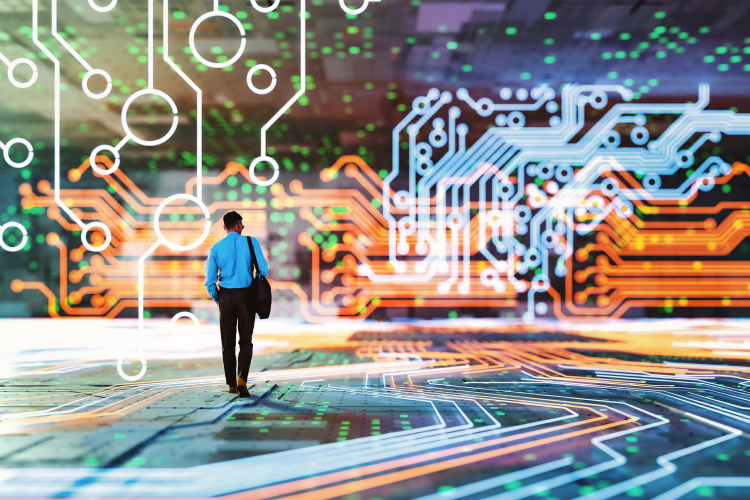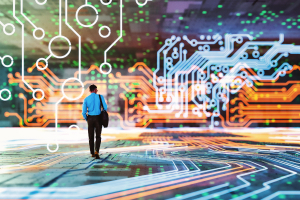How Artificial Intelligence is Transforming the World


Artificial Intelligence (AI) stands at the forefront of technological innovation, opening doors to endless possibilities and opportunities. With its unparalleled ability to process vast amounts of data, analyze patterns and make intelligent decisions, AI holds the potential to revolutionize industries, reshape economies and redefine daily life in ways previously unimaginable.
From enhancing productivity in manufacturing to unlocking new frontiers in healthcare, AI is driving transformative change across diverse sectors. Here are some ways that AI is transforming the world:
AI in business and industry
Businesses that embrace Artificial Intelligence (AI) can use it to enhance operations, improve efficiency and elevate customer experiences. A Forbes Advisor survey sheds light on the pervasive adoption of AI across various industries: Over half of the surveyed businesses are leveraging AI for cybersecurity and fraud management.
Others are using it for customer service, digital personal assistants and content production. For example, AI-powered chatbots are changing customer interactions, with 73% of businesses using or planning to use them for instant messaging, according to the Forbes Advisor survey.
While businesses can anticipate numerous benefits from AI adoption, concerns still persist. The same Forbes survey indicates that some businesses worry about AI’s effect on their business’s visibility on search engines, technology dependence and workforce reduction due to AI integration.
Despite these apprehensions, the survey shows that 64% of business owners foresee a positive effect of AI, especially in terms of customer relationship improvements, productivity enhancement and cost savings.
AI in healthcare
AI is not just changing business; it’s helping save lives. The global AI in healthcare market was valued at approximately $15 billion in 2022 and is projected to surge to nearly $188 billion by 2030, according to Precedence Research.
Additionally, nearly 30% of healthcare organizations surveyed reported AI applications were in production, according to O’Reilly’s 2022 survey on AI adoption.
AI has the potential to make a big difference in healthcare, affecting everything from diagnosing illnesses to developing new drugs. It’s being used in various ways, like streamlining paperwork, improving surgeries, and spotting healthcare fraud.
With AI-powered tools, doctors can give more accurate diagnoses and treatment plans, sometimes even better than humans. A study led by researchers at Stanford Medicine found that computer algorithms powered by Artificial Intelligence based on deep learning can help healthcare practitioners diagnose skin cancers more accurately.
Beyond individual patient care, AI’s effect extends to population health management and drug safety. Through the analysis of massive healthcare datasets, AI can help providers track infectious diseases, monitor patient health in real time and enhance drug safety protocols.
The widespread integration of AI into healthcare practices also raises ethical and regulatory concerns. Issues such as bias, transparency, privacy and safety must be carefully addressed to ensure responsible AI governance.
Recognizing these challenges, the World Health Organization has outlined principles and recommendations to guide the ethical and regulatory framework surrounding AI in healthcare. As AI continues to shape the future of healthcare, responsible governance remains essential to harness its transformative potential for the betterment of global healthcare systems and patient well-being.
AI in education and learning
Integrating AI into education extends beyond the worries about students using tools like ChatGPT to write their papers—it can also be a powerful force for enhanced learning.
Learning management systems and online platforms can integrate AI into their applications to help personalize learning experiences tailored to students’ needs and preferred style. By collecting and analyzing data on students’ past performance, engagement levels, and interactions with learning materials, AI can identify patterns and trends to tailor educational content accordingly. For example, if a student learns better through visual aids, AI applications can prioritize delivering visual learning materials such as videos or infographics.
For educators, AI analytics can empower them to make data-driven decisions by tracking student progress, identifying areas of improvement and allocating resources effectively. With AI-driven insights, educators can tailor their teaching strategies to meet the diverse needs of their students, enhancing overall teaching effectiveness.
Moreover, AI supports educators by automating administrative tasks, freeing valuable time to redirect toward more meaningful interactions with students.
Overall, integrating AI into education can empower students and educators to achieve greater success in teaching and learning.
AI in transportation
The transportation industry has seen remarkable advancements throughout history, from the invention of steamboats in 1787 to the development of autonomous vehicles and drone taxis today. These innovations have reshaped how we move goods and people from one place to another and Artificial Intelligence is pivotal in continuing to drive this transformation forward.
Imagine cruising down the road with fewer traffic jams and smoother travel. Smart traffic management systems, powered by AI, work behind the scenes to optimize the flow of vehicles. This means less time stuck in traffic, making your daily commute or road trips more enjoyable and efficient. Plus, with better traffic flow, improved air quality and a safer driving environment are additional potential benefits. These systems adapt to changing conditions in real-time, so you’ll feel the benefits of smoother traffic patterns wherever you go.
Additionally, have you ever received a delivery that arrived faster than expected? AI-powered logistics play a role here, too. By forecasting demand and optimizing delivery routes, packages can reach their destinations more quickly and efficiently. So, whether you’re eagerly awaiting an online order or receiving essential goods, AI helps ensure timely and reliable deliveries, enhancing your overall convenience and satisfaction.
AI and environmental sustainability
AI plays a vital role in addressing environmental issues and promoting sustainability. It improves our understanding of climate change through advanced modeling, enabling better decision-making. By analyzing vast amounts of data, AI provides insights into climate patterns, trends and potential impacts, empowering policymakers and stakeholders to devise effective strategies for mitigation and adaptation.
For example, predictive AI can help identify opportunities for energy efficient improvements, such as renewable energy sources like solar and wind power. These transitions could help reduce reliance on fossil fuels and greenhouse gas emissions, aligning with global efforts to combat climate change.
In addition to its role in energy management, AI plays a crucial part in conservation initiatives worldwide. By deploying sensors, drones and other advanced technologies, AI enables real-time monitoring of wildlife populations and habitats, helping conservationists identify threats and implement targeted interventions. Moreover, AI-powered algorithms analyze satellite imagery to detect illegal activities such as poaching and deforestation, enabling authorities to take timely action to protect endangered species and preserve vital ecosystems.
The future of AI
Looking ahead, the future of AI is filled with promise and possibilities:
- Continued innovation: AI’s evolution hinges on ongoing research and development, driving innovation forward. Trends like explainable AI and ethics considerations highlight the field’s maturation and emphasize the importance of ethical development.
- Human-AI collaboration: The potential of how Artificial Intelligence is transforming the world lies in its ability to complement human capabilities, fostering new forms of collaboration and creativity. Through human-AI collaboration, individuals can leverage AI’s analytical power to tackle complex problems and unlock innovative solutions.
- Societal impact: While AI promises numerous benefits, it also raises concerns about its societal impact. Job displacement, algorithmic bias and privacy breaches underscore the need for responsible AI governance to ensure AI serves the collective good and fosters inclusivity and equity.
Navigating the future of AI requires embracing innovation, fostering collaboration and prioritizing responsible governance to harness its transformative power for positive change.
Contribute to the AI revolution
The AI revolution is underway, profoundly reshaping the world across various sectors and industries. From business and healthcare to education, transportation and environmental sustainability, AI transforms how we live, work and interact with the world around us.
Explore the online Master of Science in Artificial Intelligence or Certificate in AI from Maryville University and unlock exciting career opportunities in this rapidly growing field. Whether you’re a seasoned professional or just starting your career, our AI programs provide the knowledge, skills and expertise you need to contribute to how Artificial Intelligence is transforming the world.
Recommended Readings:

